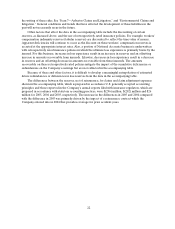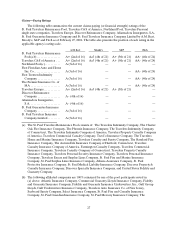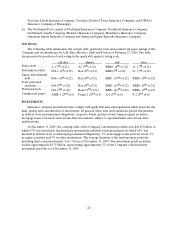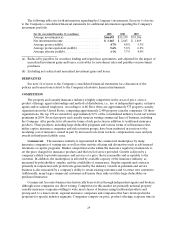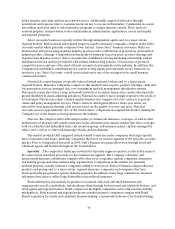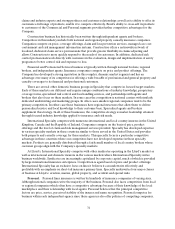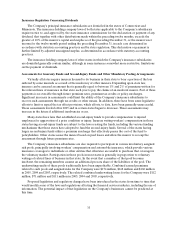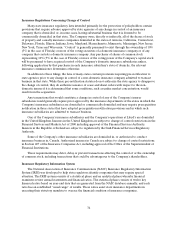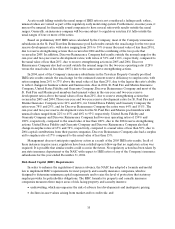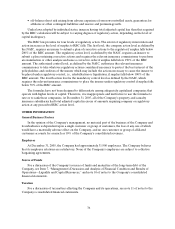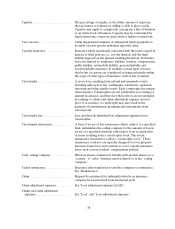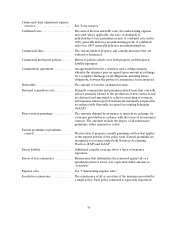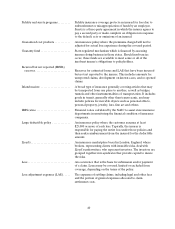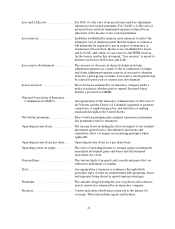Travelers 2005 Annual Report Download - page 44
Download and view the complete annual report
Please find page 44 of the 2005 Travelers annual report below. You can navigate through the pages in the report by either clicking on the pages listed below, or by using the keyword search tool below to find specific information within the annual report.32
At the agency level, competition is primarily based on price and the level of service, including claims
handling, as well as the level of automation and the development of long-term relationships with individual
agents. Personal also competes with insurance companies that use exclusive agents or salaried employees
to sell their products. In addition to its traditional independent agency distribution, Personal has
broadened its distribution of products by marketing to sponsoring organizations, including employee and
affinity groups, and through joint marketing arrangements with other insurers. Personal believes that its
continued focus on expense management practices, underwriting and pricing segmentation, and claim
settlement effectiveness strategies enable Personal to price its products competitively in all of its
distribution channels.
REGULATION
State Regulation
The Company’s insurance subsidiaries are subject to regulation in the various states and jurisdictions
in which they transact business. The extent of regulation varies, but generally derives from statutes that
delegate regulatory, supervisory and administrative authority to a department of insurance in each state.
The regulation, supervision and administration relate, among other things, to standards of solvency that
must be met and maintained, the licensing of insurers and their agents, the nature of and limitations on
investments, premium rates, restrictions on the size of risks that may be insured under a single policy,
reserves and provisionsfor unearned premiums, losses and other obligations, deposits of securities for the
benefit of policyholders, approval of policy forms and the regulation of market conduct, including the use
of credit information in underwriting as well as other underwriting and claims practices. In addition, many
states have enacted variationsof competitive rate-making laws, which allow insurers to set certain premium
rates for certain classes of insurance without having to obtain the prior approval of the state insurance
department. State insurance departments also conduct periodic examinations of the affairs of insurance
companies and require the filing of annual and other reports relating to the financial condition of
companies and other matters. At the present time, the Company’s insurance subsidiaries are collectively
licensed to transact insurance business in all states, the District of Columbia, Guam, Puerto Rico,
Bermuda, and the U.S. Virgin Islands, as well as Australia, Canada, New Zealand, the Philippines, the
United Kingdom, the Republic of Ireland, South Africa and Central and South America.
As part of ongoing, industry-wide investigations, the Company and its affiliates have received
subpoenas and written requests for information from government agencies and authorities, including 18
states and the SEC. The areas of inquiry addressed to the Company include its relationship with brokers
and agents, the Company’s involvement with “non-traditional” insurance and reinsurance products,
branding requirements for salvage automobiles and the reporting of workers’ compensation premiums.
The Company is cooperating with these subpoenas and requests for information. See “Part I—Item 3—
Legal Proceedings” for further discussion.
Insurance Holding Company Statutes
As a holding company, the Company is not regulated as an insurance company. However, as the
Company owns capital stock in insurance subsidiaries, it is subject to state insurance holding company
statutes, as well as certain other laws, of each of the states of domicile of the Company’s insurance
subsidiaries. All holding company statutes, as well as other laws, require disclosure and, in some instances,
prior approval of material transactions between an insurance company and an affiliate. The holding
company statutes as well as other laws also require, among other things, prior approval of an acquisition of
control of a domestic insurer, some transactions between affiliates and the payment of extraordinary
dividends or distributions.


